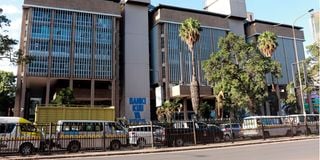Pain for borrowers as bank loan charges rise

Central Bank of Kenya head office in Nairobi.
Banks have begun raising charges on their loans after the Central Bank of Kenya (CBK) raised the base lending rate to tame rising inflation.
One lender, NCBA Bank, has already notified its customers of the higher interest rates that will take effect on January 6 next year.
The bank has raised the base lending rate for its Kenya shilling-denominated loans to 11 per cent from 10 per cent and its dollar-denominated loans to 10 per cent from 9 per cent.
“Dear customer, this is to notify you of a change in our shilling and US dollar base lending rates from 10 percent to 11 percent per annum and 9 percent to 10 percent per annum respectively effective January 6, 2023,” said NCBA.
Another Tier-I lender disclosed to Nation that it would adjust interest rtes once it gets a nod from the regulator.
Lenders are required to seek approval from the CBK to adjust their lending rates after which they have to issue a one-month notice to their customers notifying them of the lending rates adjustment.
The increase in interest rates will worry borrowers at a time many are relying on loans to pay for their daily expenses amid the headache of a high cost of living.
The CBK last month raised the base lending rate for the second time in a row to discourage borrowing and thus tighten spending.
The Monetary Policy Committee (MPC), which is the CBK’s top decision-making organ on fiscal policy that sits every two months, raised the Central Bank Rate (CBR) by 50 basis points to 8.75 percent up from 8.25 percent.
It was the first consecutive increase in the base lending rate this year after the CBK raised the rate in September to 8.25 percent up from 7.5 percent.
CBK Governor Patrick Njoroge said the decision was informed by sustained inflation amid continued global risks that could unleash further negative impacts on the local economy.
“The Committee noted the sustained inflationary pressures, the elevated global risks, and their potential impact on the domestic economy and concluded that there was scope for a further tightening of the monetary policy in order to anchor inflation expectations,” said Dr Njoroge.
The increases in loan rates some at time most households are battling with a high cost of living.
The country's inflation stood at 9.5 percent in November amid high appetite for loans with households borrowing Sh213.5 million daily from commercial banks, microfinance banks, and saccos in the nine months to September.
CBK data shows private households borrowed Sh58.3 billion from financial institutions between January and September, which is four times more than the Sh14.4 billion or Sh52.7 million daily that lenders disbursed during the same period last year.





